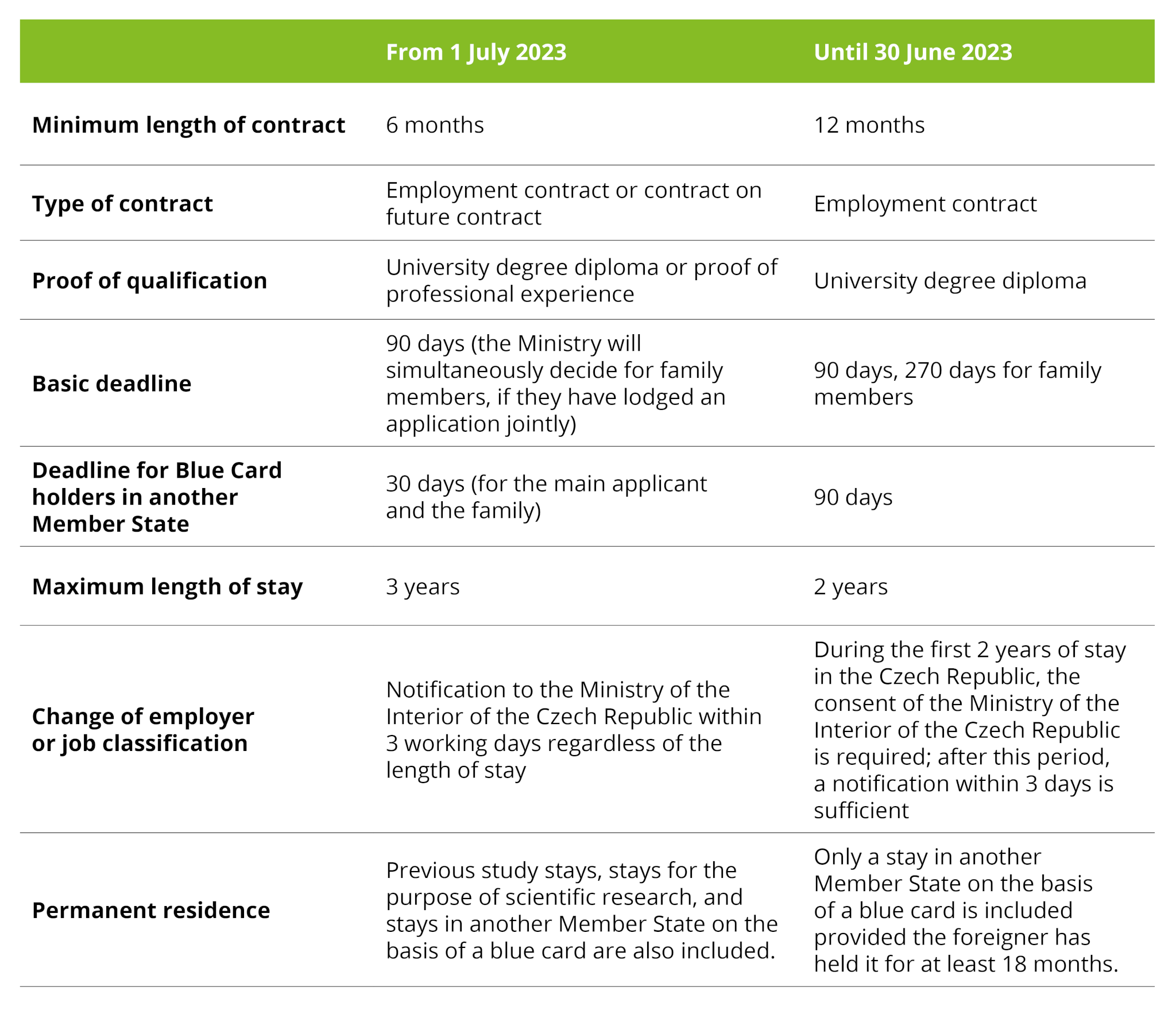The harmonisation of EU law should make it easier for highly qualified employees to enter the Czech Republic and stay there thereafter. How will the changes affect blue cards?

The simplification has also been incorporated into the amendment to the Employment Act: The labour market test is cancelled and it is possible to apply for a blue card immediately after the vacancy is published in the central register of vacancies.
If a foreigner applies for a blue card in the Czech Republic as a blue card holder in another Member State, they will be able to work in the position on the 30th day after applying for a blue card, even if their application has not yet been decided.
These changes should make the blue card more attractive for employees and employers. We will see what impact the changes will have in practice.
In this regard, it will not be a simplification of the process, but in many ways a complication. Although a document similar to a criminal record extract has almost always been requested in practice for visa or residence permit applications, it will now be a legal requirement for all applicants. They will be obliged to obtain it in the country of their citizenship. This document will also have to be presented for countries where the applicant has spent a total of 6 months in the last 3 years (compared to the previous rule where only a continuous 6-month stay was a condition) on request.
The change will also affect the possibility of submitting an application to an embassy in a country other than the country of citizenship. In order to be entitled to apply for a visa or residence permit at the embassy of the country in which they lawfully reside, the foreigner must be a long-term or permanent resident and have resided there continuously for at least 2 years.
A positive point for applications to embassies is the new possibility to submit official registry documents (e.g. birth certificate, marriage certificate) in electronic form.
A positive change for tolerance visa or tolerated residence permit holders is the fact that it will now be possible to leave the Czech Republic without the visa expiring. Holders of this type of visa will be able to travel within the Schengen area. The visa or residence permit will only be cancelled if the person leaves the territory of the EU. This does not apply to temporary protection holders who can also travel outside EU countries (e.g. back to Ukraine).
Only minors under the age of 18 will be able to apply for long-term residence for the purpose of family reunification. Dependent adult children under 26 will no longer be able to reunite with their parents and will have to apply for another type of residence, such as a student visa.
Another change is in the area of the obligation of foreigners to appear in person at the Ministry upon arrival in the Czech Republic in order to obtain the biometric data necessary for the production of a residence permit. The existing deadline of 3 working days has been changed to 30 calendar days from the arrival of the foreigner in the Czech Republic. From practice, we have learned that the above-mentioned period of 3 working days was unreasonably short, and therefore the change is welcomed.
The amendment streamlines the use of seasonal visas, specifically extending their validity to 9 months. The previous maximum duration for a long-term visa was only 6 months, which was not sufficient in some sectors.
The amendment stipulates that a foreigner will be entitled to apply for a permanent residence permit after 5 years of continuous residence if they are residing in the Czech Republic on the basis of a residence permit that is valid, not if they are residing in the territory only on the basis of a so-called fiction of residence. In practice, this means that the foreigner will not be able to apply for permanent residence in the procedure for an extension of long-term residence.
Children with long-term residence and children born in the Czech Republic who apply for long-term residence will also be included in the public health insurance system. However, unlike Czech children, their parents will pay the insurance premiums for them. The change will apply from 1 January 2024. We will inform you in advance about other conditions.
We can say that the amendment to the Act on the Residence of Foreigners reflects the already established practice in many respects and implements it directly into the law. The changes resulting from the transposition of the Directive of the European Parliament and the Council on blue cards are clearly more advantageous for foreigners and make blue cards much more attractive. On the other hand, it seems that some of the changes will be unfavourable for foreigners and may complicate the process of obtaining residence.
ImmigrationEmployment of ForeignersdReport newsletter